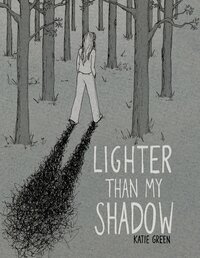Take a photo of a barcode or cover
dark
emotional
hopeful
informative
fast-paced
Hefty read, but was able to read it in one day.
Trigger warning for anorexia, sexual abuse.
Trigger warning for anorexia, sexual abuse.
challenging
dark
emotional
medium-paced
challenging
emotional
hopeful
reflective
sad
slow-paced
Graphic: Body shaming, Bullying, Eating disorder, Fatphobia, Mental illness, Sexual assault, Sexual violence, Suicidal thoughts, Grief, Dysphoria
Moderate: Adult/minor relationship, Bullying, Chronic illness, Self harm, Sexual violence, Vomit
emotional
hopeful
reflective
sad
challenging
emotional
hopeful
inspiring
reflective
medium-paced
emotional
hopeful
reflective
fast-paced
Reading Lighter Than My Shadow was an emotional and thought-provoking experience for me. Eating disorders have always been an enigma in my mind—something I’ve struggled to understand fully. While I don’t have an eating disorder myself, I do struggle to eat enough to gain weight, and that makes me relate, in some ways, to the themes of food, control, and body image explored in this book.
The Artwork: A Perfect Reflection of the Story
One of the first things that stood out to me was the artwork. The dull, muted brown tones and the simple, almost sketch-like illustrations create an atmosphere of gloom that feels so fitting for the subject matter.
The way Green visually represents her struggles, especially the growing black scribbles that seem to swallow her whole, hit me hard. I could feel the weight of her emotions through the pages, and as she slowly moves toward healing and recovery, the artwork also begins to shift. It’s such a powerful way to tell a story, using visuals to make emotions almost tangible.
Mental Health and Eating Disorders: A Much-Needed Discussion
What struck me the most was how the book highlights the connection between mental health struggles and eating disorders. It’s not just about food or weight—it’s about control, anxiety, trauma, and how unresolved emotions can manifest in destructive ways. Green’s story makes it clear that eating disorders don’t develop in isolation; they are deeply tied to one’s childhood and adolescent experiences, relationships, and internal battles.
This book also made me think about how eating disorders are often misunderstood. Society tends to dismiss them as mere vanity issues, but Green’s memoir shatters that misconception. It’s a painful yet necessary reminder that recovery isn’t a straight path and that seeking help can sometimes lead to more harm if the wrong people are involved.
The Struggles of Growing Up: Something We All Relate To
Beyond the theme of eating disorders, I saw Lighter Than My Shadow as a book about the challenges of adolescence, something everyone can connect with, something the aftermath of which I am struggling to come to terms with even in my thirties.
The strained relationship between Katie and her mother, the pressures of fitting in, the confusion of first love, and the impact of peer bullying all add depth to the story. It reminded me how fragile teenage years can be and how small moments, both good and bad, can leave a lasting impact.
As I turned the last page of Lighter Than My Shadow I felt deeply moved, even recovered like Katie. Katie Green doesn’t just tell a story; she invites readers into her world, exposing her pain, fears, and moments of hope with brutal honesty.
It’s a graphic novel that lingers in your mind long after you finish it. Whether you have personal experience with eating disorders or not, this memoir is a must-read for anyone interested in mental health, recovery, and the silent struggles people go through.
challenging
dark
emotional
hopeful
inspiring
reflective
sad
medium-paced
While Lighter Than My Shadow was a 2-star read for me, it would probably be much more meaningful to a reader who has experienced an eating disorder, depression or anxiety. It reminded me strongly of My Lesbian Experience with Loneliness, another wrenching read that dealt mainly with mental illness.
The art was almost all gray and black; the lack of color and the sameness of people's features made it difficult for me to tell them apart at times. I recognize recovery was a long, hard road for the author, but the book felt repetitive, as she spiraled and struggled over and over with the same issues. It wasn't quite for me.
The art was almost all gray and black; the lack of color and the sameness of people's features made it difficult for me to tell them apart at times. I recognize recovery was a long, hard road for the author, but the book felt repetitive, as she spiraled and struggled over and over with the same issues. It wasn't quite for me.
Wow! This is breathtakingly, tear-jerkingly brilliant. Thank you Katie for sharing your story.



